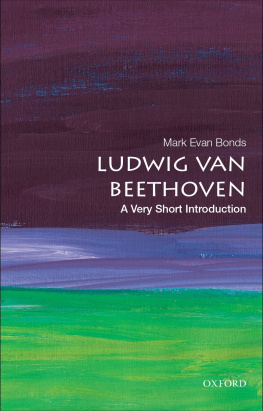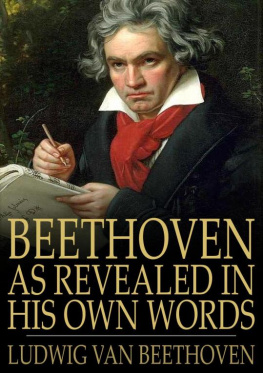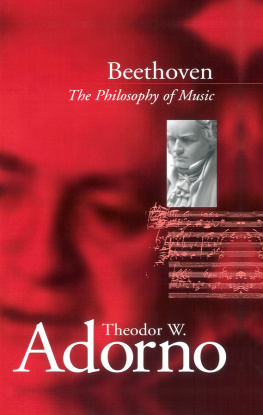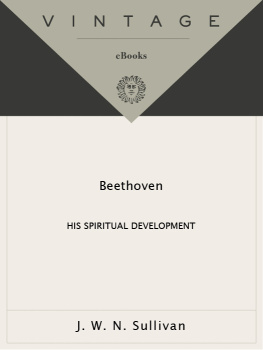Copyright 2014 by Jan Swafford
All rights reserved
For information about permission to reproduce selections from this book, write to Permissions, Houghton Mifflin Harcourt Publishing Company, 215 Park Avenue South, New York, New York 10003.
www.hmhco.com
The Library of Congress has cataloged the print edition as follows:
Swafford, Jan.
Beethoven : anguish and triumph : a biography / Jan Swafford.
pages cm
Includes bibliographical references and index.
ISBN 978-0-618-05474-9
1. Beethoven, Ludwig van, 17701827.
2. ComposersGermanyBiography. I. Title.
ML 410. B 4 S 94 2014
780.92dc23
[ B ]
2014011681
e ISBN 978-0-544-24558-7
v1.0714
IN MEMORIAM
Frances Cohen Gillespie
Painter
19391998
Could a historiographer drive on his history, as a muleteer drives on his mule,straight forward;for instance, from Rome all the way to Loretto, without ever once turning his head aside either to the right hand or to the left,he might venture to foretell you an hour when he should get to his journeys end;but the thing is, morally speaking, impossible: For, if he is a man of the least spirit, he will have fifty deviations from a straight line to make with this or that party as he goes along, which he can no ways avoid. He will have views and prospects to himself perpetually soliciting his eye, which he can no more help standing still to look at than he can fly.
LAURENCE STERNE , Tristram Shandy
Fame is a form of incomprehension, perhaps the worst.
JORGE LUIS BORGES
My custom even when I am composing instrumental music is always to keep the whole in view.
BEETHOVEN
Introduction
There has always been a steady trickle of Beethoven biographies and always will be, as long as the fascination of the music and the man endures. That bids to be a long time. Like Shakespeare, Rembrandt, and a few other figures in our creative history, Beethoven has long since been a cultural artifact, woven into our worldview and into our mythologies from popular to esoteric.
A few miles from where I write, his is the only name inscribed on a plaque over the proscenium of Boston Symphony Hall, built at the end of the nineteenth century. In our time, a performance of the Ninth Symphony celebrated the fall of the Berlin Wall. In Japan, important occasions such as the opening of a sumo arena are marked by a performance of Daiku, the Big Nine. Around the world, the Fifth is seen as the definition of a Classical symphony. When I taught in a conservatory, there were few days when we didnt hear Beethoven drifting down the hall. My Beethoven seminars were full of young musicians whose professional lives were going to be steadily involved with the composer.
There is, of course, great danger in that kind of ubiquity. To become more of an icon than a man and artist is to be heard less intimately. Unlike others of his status, Beethoven has been relatively immune to the usual historical ebbs and flows of artistic reputations. That has happened partly because in the decades after his death the concert hall evolved into more of a museum of the past than an explorer of the present. That situation too has its dangers. Instrumental music is in many ways a mysterious and abstract art. With Shakespeare and Rembrandt, we can be anchored in the manifest passions in their works, their racy jokes, their immediacy. It is that immediacy that is all too easy to lose when confronting iconic musicians like Beethoven, Bach, and Brahms.
In the two-century course of Beethovens fame, he has inevitably been batted about by biographers and other writers. He was born during the Aufklrung, the German embodiment of the Enlightenment, and came of age during the revolutionary 1780s. Many in his time saw him as a musical revolutionary and connected him to the spirit of the French Revolution. By the time he died in 1827, he was already a Romantic myth, and that is what he stayed through the nineteenth century: Beethoven the demigod, a combination of suffering Christ figure and demonic icon. In his person rough, crude, and fractious, in his music everything from crude to transcendent, he became the quintessential Romantic genius in an age that established a cult of genius that lingers on, for well and ill.
Critical reframings and reinterpretings are inevitable, and like everything in the arts they reflect the temper of their times. After the lingering decay of Romantic myths in the twentieth century, writing on Beethoven during the past decades has largely risen from the academy, so it reflects the parade of fashions and shibboleths of that industry. Many present-day books concern ideas about Beethoven rather than Beethoven himself. The assorted theoretical postures of late twentieth-century academe took some heavy shots at him, but do not seem to have dislodged him from his unfortunate pedestal, which I believe lodges him too far from us.
I suspect many people still feel that in some ways the most effective Beethoven biography remains the massive late nineteenth-century one by Alexander Wheelock Thayer. That American writer set out with the goal of assembling every available fact about Beethoven and putting it down as clearly as possible. I fight for no theories and cherish no prejudices, Thayer wrote. [M]y sole point of view is the truth. In the 1960s, the book was corrected and updated, with a similarly direct agenda, by Elliot Forbes. For me it is within Thayers Victorian language that Beethoven casts the strongest shadow as a person, where I catch glimpses of him walking down the street, joking with friends, thumping the table as he composes, tearing into his fish dinner.
Without aspiring to the voluminousness of Thayer, the book you are reading was written in his spirit. Now and then in the course of an artists biographical history, it comes time to strip away the decades of accumulated theories and postures and look at the subject as clearly and plainly as possible, without prejudices and preconceptions. That as biographers we all have agendas, both known and unknown to us, does not change the value and necessity of getting back to the human reality of a towering figure. This book is a biography of Beethoven the man and musician, not the myth. To that end I have relegated all later commentary to the endnotes. I want the book to stay on the ground, in his time, looking at him as directly as possible as he walks, talks, writes, rages, composes.
We will see that Beethoven was in some ways a hard man. The troubling parts of his personality, the squalor he lived in, his growing paranoia and delusions of persecution, his misanthropy, and later his double-dealings in business will be on display here roughly in the proportion that they were on display in his life. Likewise the plaintive history of his deafness and illness and his failed love affairs. Still, I believe that in the end there was no real meanness in Beethoven. He aspired to be a good, noble, honorable person who served humanity. At times he could be entirely lovable and delightful in his quirks and puns and metaphors and notions, even in his lusty sociopolitical rants. There was something exalted about him that was noted first in his teens and often thereafter. He was utterly sure of himself and his gift, but no less self-critical and without sentimentality concerning his work.
To the degree that I have a conscious agenda, it is this: I am myself a composer, both before and after being a biographer, so this is a composers-eye view of a composer, written for the general public. When I look at Beethoven I see a man sitting at a table, playing the piano, walking in fields and woods doing what I and a great many others have done: crafting music one note, one phrase, one section at a time. I hear the scratch of a quill pen on lined music paper. I see a work coming into focus in page after tumultuous page of sketches. I see a man in the creative trance all of us work inbut Beethovens trance deeper than most, and the results incomparably fine and far-ranging.
Next page












